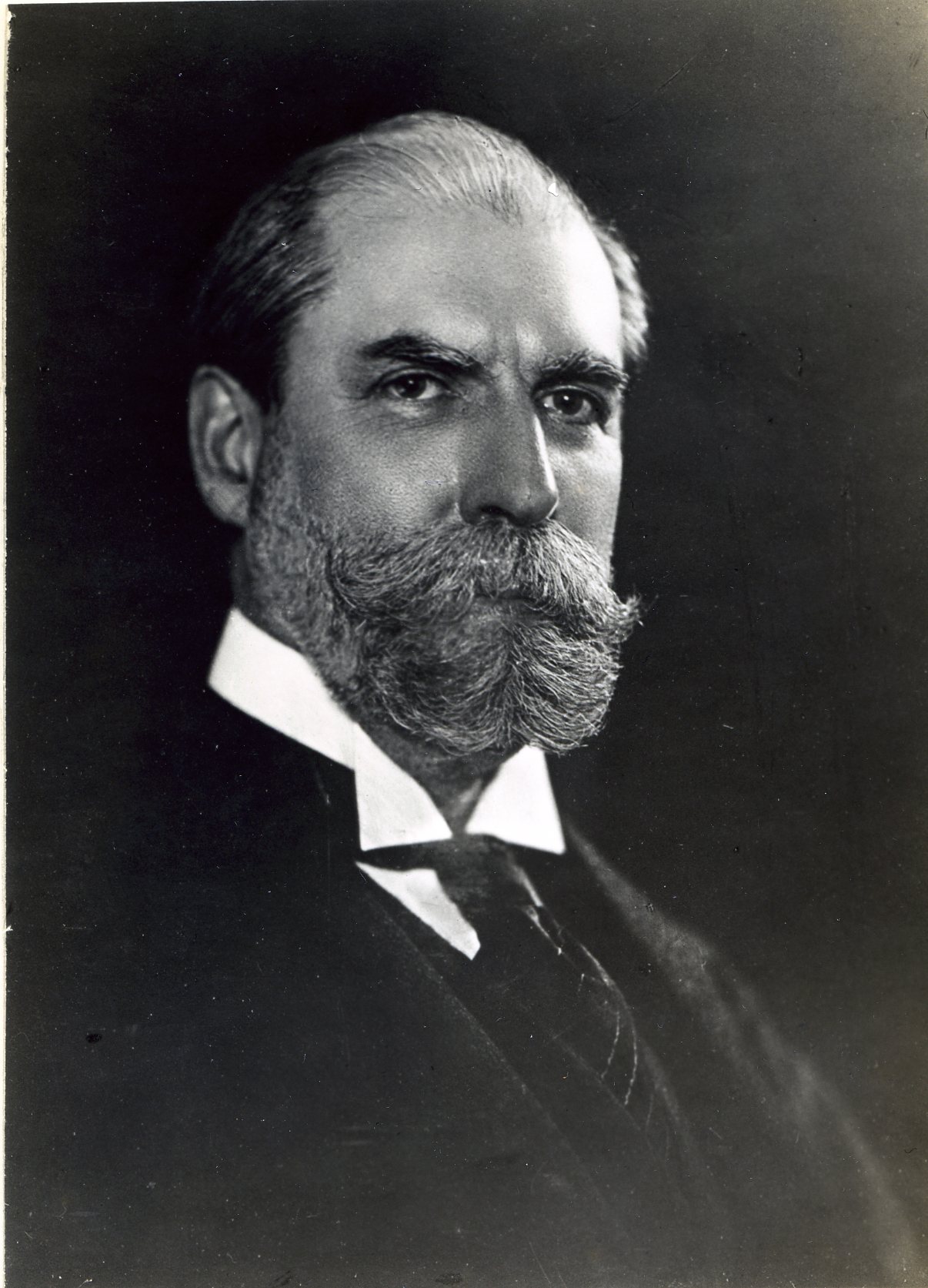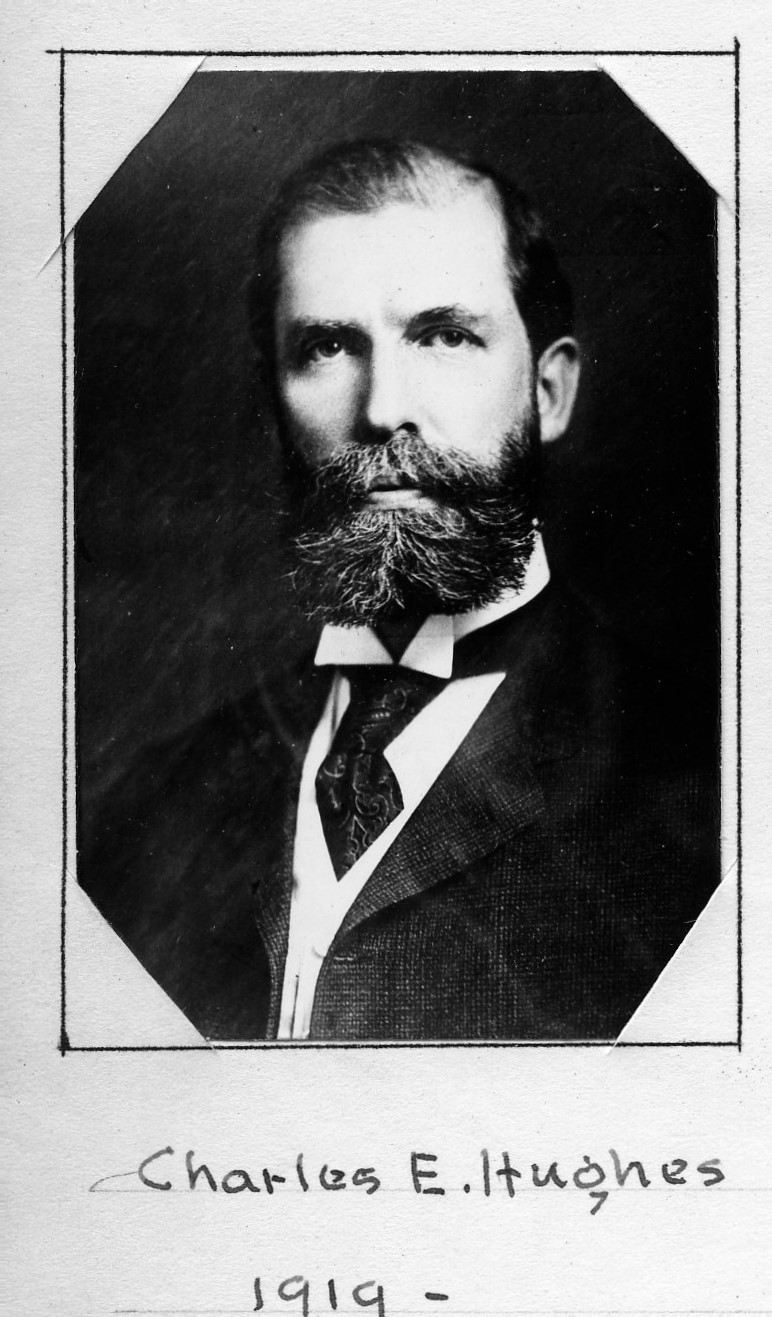Lawyer/Governor of New York/U.S. Secretary of State/Chief Justice of the United States
Centurion, 1919–1948
Born 11 April 1862 in Glens Falls, New York
Died 27 August 1948 in Osterville, Massachusetts
Buried Woodlawn Cemetery , Bronx, New York
, Bronx, New York
Proposed by George W. Wickersham and James Byrne
Elected 7 June 1919 at age fifty-seven
Archivist’s Note: Father of Charles Evans Hughes, Jr.
Century Memorials
Charles Evans Hughes. [Born] 1862. Lawyer, Governor of New York, Justice of the United States Supreme Court, Secretary of State, and Chief Justice of the United States.
When a man like me sits down to write of a man like him, some sayings of Bill Ivins’ come irresistibly and painfully to mind: “Our responses are determined and restricted by our own characters and experiences. . . . It is to be feared that no one except perhaps a very sensitive draughtsman can say anything of importance about drawing and drawings—and even he, only when the drawing of which he speaks is temperamentally and otherwise in his own order of ideas and emotions.” I can only do the best I can, which will not be good enough; for I could not think that I am temperamentally and otherwise in his order of ideas and emotions.
His career, most of you know better than I: His work for the Armstrong Committee of the New York Legislature investigating the insurance business in New York, established a venal link between corrupt politics and corrupt finance and thanks to him the insurance business became a public trust instead of a public swindle. Then he was twice elected Governor of New York. In Albany apparently he pleased nobody except the voters, who did not care if he was or was not “the human iceberg,” as described, or that he radiated no glamour and spouted no oratory. He made no political promises: the public just trusted his mental power, his honesty, and his judgment.
From then on,except for intervals of practicing law to provide, as he used to say, a little for his old age, his life was in the public domain: six years as Associate Justice of the Supreme Court, four years as Secretary of State, Chairman of the Conference on the Limitation of Armament, Member of the Permanent Court of Arbitration at The Hague for four years, Judge of the Permanent Court of International Justice for two years, Chief Justice of the United States for eleven years. These are positions which carry with them their own commentary: they sum up a lifetime of public service based upon the inherited and carefully trained powers of his mind, his genius as an enlightened liberal and the distinction and superiority which from boyhood had been his.
In Hilary Term, 1616, Sir Francis Ashley, in Middle Temple Hall read his lectures on Magna Carta, saying of his study of the Great Charter, that he had found there “Liberty to the person and safety to the Lyves and Estates. And in brief I found that they were bought too dear to be sold too cheap.”
Our fellow member’s career at the bar, in public administration and on the bench, exemplifies Ashley’s words. In the welter of law suits of complicated modern life he knew the issue always to be on liberty to the person with safety to lives and property: and he knew that they had been bought too dear to be sold too cheap.
I end as I began: that I know my responses to this great man have been determined and restricted by my own character and experience, so let a very great lawyer, and a great draughtsman to use Bill Ivins’ words, make the summing up: He is Frederick Maitland speaking of Sir Henry Maine: “He was much more than learned, but then he was learned, very learned in law of all sorts and kinds. It is only through learning wide and deep, tough and technical, that we can safely approach those world-wide questions that he raised or criticize the answers that he found for them. What is got more cheaply will be guess-work or a merely curious collection of odds and ends, of precarious odds and questionable ends.”
Charles Evans Hughes was much more than learned, but he was very learned and there were no precarious odds or questionable ends in the baggage of this great man’s mind or heart.
Source: Henry Allen Moe Papers, Mss.B.M722. Reproduced by permission of American Philosophical Society Library & Museum, Philadelphia
Henry Allen Moe
Henry Allen Moe Papers, 1948 Memorials
Hughes was born in Glens Falls and attended Madison College (now Colgate University) before transferring to Brown. He graduated in 1881, then attended Columbia Law School, graduating in 1884. In 1885, he met Antoinette Carter, the daughter of a senior partner of the law firm where he worked, and they were married in 1888. They had two children.
In 1891, Hughes left the practice of law to become a professor at the Cornell University Law School, but in 1893 he returned to his old law firm. In 1905, he was appointed as counsel to a New York state legislative committee investigating utility rates, where his uncovering of corruption led to lower gas rates in New York City. This positioned him to win elected office in 1906 when he defeated William Randolph Hearst to become Governor of New York.
Hughes was offered the vice-presidential nomination in 1908 by William Howard Taft but declined. In October 1910, Hughes was appointed by Taft as an Associate Justice of the Supreme Court but resigned on June 16, 1916, to be the Republican candidate for President. After losing the election he returned to private practice, and he re-entered government service as Secretary of State under President Harding.
Herbert Hoover, who joined the Century the same month as Hughes in 1919, appointed him as the Chief Justice in 1930, a year after Hoover had appointed his son Charles Evans Hughes, Jr. as Solicitor General. Hughes was Chief Justice for 11 years before being succeeded by Harlan Fiske Stone. Hughes died on Cape Cod in 1948.
James Charlton
“Centurions on Stamps,” Part I (Exhibition, 2010)


